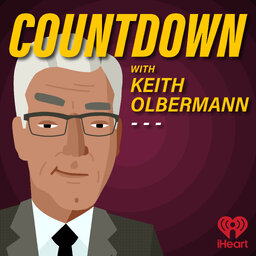TRUMP VIOLATED YOUR WARNING, JUDGE. JAIL HIM! - 4.5.23
EPISODE 171: COUNTDOWN WITH KEITH OLBERMANN
A-Block (1:41) SPECIAL COMMENT: Judge Juan Merchan was balanced and calm and fair. The Defendant AND The District Attorney must restrain themselves. "Please refrain from making statements that are likely to incite violence or civil unrest." Please do not use rhetoric that "could jeopardize the rule of law."
SIX HOURS LATER Donald Trump said "the real criminal" was District Attorney Alvin Bragg. He attacked Bragg's wife. He said that he had "a Trump hating-judge with a Trump-hating wife and a Trump-hating family." AS Judge Merchan had asked both sides to refrain from further incendiary language, Trump's idiot sons had doxxed Merchan's daughter and distributed an article bearing her photograph, and right wing media pounced on her.
DONALD TRUMP HAS ALREADY VIOLATED THE JUDGE'S GUIDELINES AND HE WILL NOT STOP UNTIL SOMEONE - OR EVERYONE - GETS HURT. THE JUDGE NEEDS TO CALL TRUMP'S LAWYERS AND TELL THEM TO PUT THEIR CLIENT'S FAT ASS ON A PLANE AND GET IT BACK TO NEW YORK BECAUSE HE IS GOING TO RIKERS ISLAND FOR CONTEMPT.
Trump already disseminated images of himself with a baseball bat in one photo and D.A. Alvin Bragg in the adjoining image. He already said there would be "death and destruction" were he to be arrested. He will not stop. He has never stopped. This judge has the chance to stop him - maybe strongly enough that finally this movement will itself stop out of the cowardice behind its bully facade.
Jail Trump for contempt - today.
B-Block (17:35) SPORTS: For the week since the baseball season began I have had the gnawing sensation that something important was missing. Last night it dawned on me that it felt as if I was at a great game but the seats next to me were empty. And indeed they are. We are without two of the poets of the game, for the first time in decades. First: In memory of Vin Scully.
C-Block (41:39) SPORTS: And, Second: In memory of Tim McCarver.
In 1 playlist(s)
Countdown with Keith Olbermann
“Countdown With Keith Olbermann,” the landmark news and commentary program that reordered the world …Social links
Follow podcast
Recent clips

BULLETIN: PRINCE ANDREW ARRESTED, SoKOREA SENTENCES PRESIDENT - WHILE WE SLEEP - 2.19.26
09:27

ARIZONA GOP WANTS TO MAKE ICE MANDATORY AT VOTING BOOTHS - 2.19.26
1:14:36

TRUMP ACCIDENTALLY REVEALS HIS PLOT TO STEAL THE MIDTERMS - 2.16.26
1:32:29
 Countdown with Keith Olbermann
Countdown with Keith Olbermann